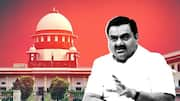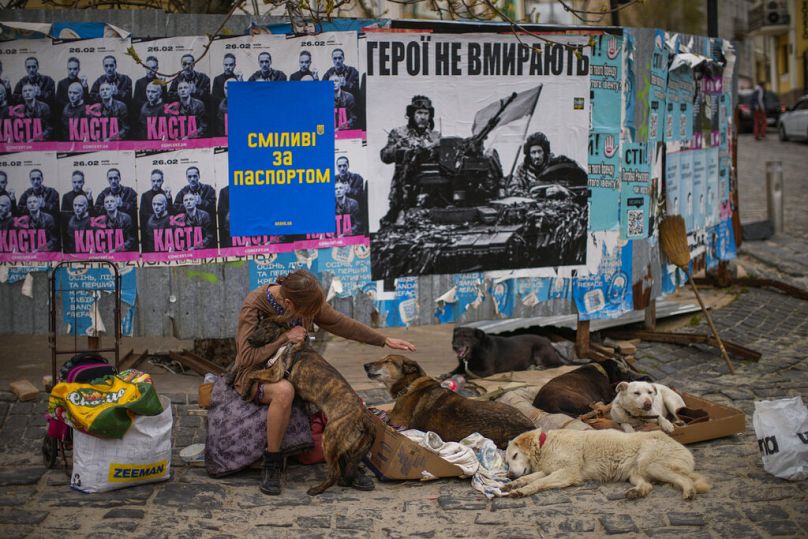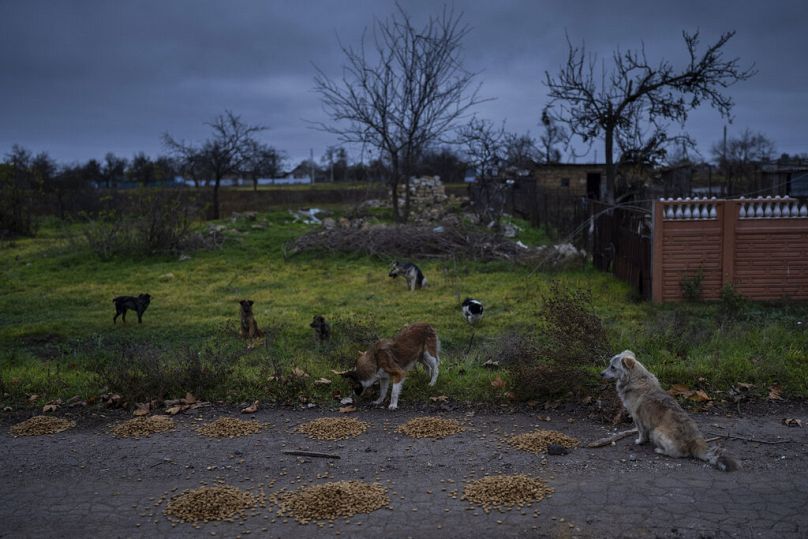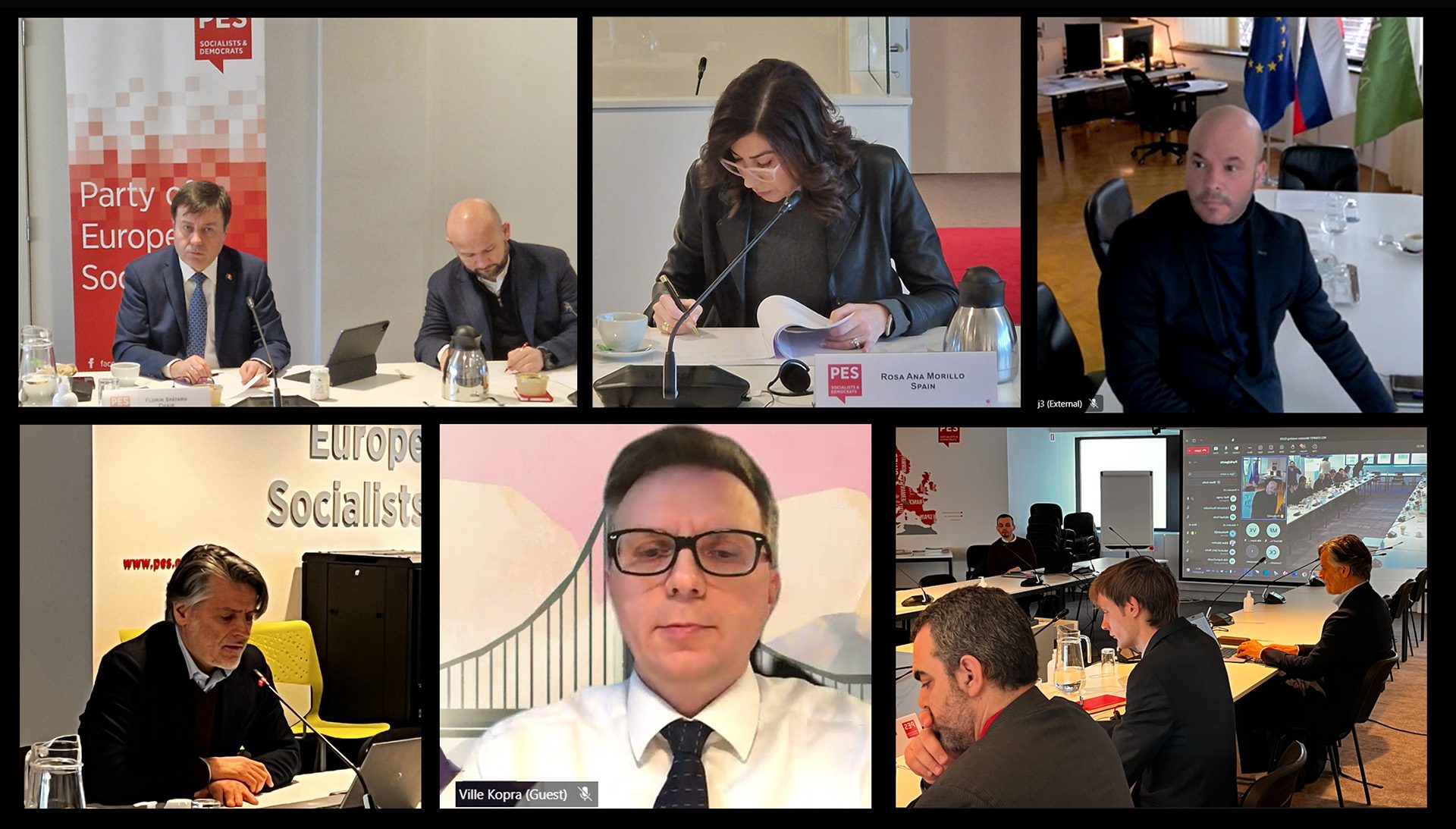We must help the animals affected by war in Ukraine — otherwise, we're risking a catastrophe
02/03/2023 -
By Daniel Fine, Co-Founder and Managing Director, Ukraine War Animals Relief Fund

Two small dogs peer out the gym bag of a refugee fleeing the war from neighbouring Ukraine, at the Romanian-Ukrainian border, in Siret, Romania, March 2022 - Copyright AP Photo/Euronews
The opinions expressed in this article are those of the author and do not represent in any way the editorial position of Euronews.
Today should have been a day of playing in the backyard, chasing a ball and digging in the dirt for Paulo.
Instead, he has been recovering from eight gunshot wounds.
He was rescued from Ukraine and brought to Poland for treatment. He spends his days healing here at ADA Foundation in Przemsyl.
He is one of the very few, one of the fortunate. You can see the pain on the poor dog's face when I take him for a walk.
He’s still excited to get back to his undersized cage for his breakfast.
Over 12 million people have fled Ukraine, and approximately 47% of Ukrainians have at least one pet, research tells us. That’s well over 5.6 million cats and dogs.
Between one and two million pets unwillingly left behind
Because you can’t fly out of Ukraine, and many of the bridges are blown up, the railway remains the main form of transportation out of the country.
And the trains are standing room only and don’t accept animals. So many had to leave their pets behind. The estimate is somewhere between one and two million.
Ukrainian Iryna caresses dogs as she asks for money to support a centre for abandoned dogs next to a poster that reads in Ukrainian: "Heroes don't die", in Kyiv, 25 April 202
2AP Photo/Francisco Seco
So, you let them loose at the station and pray for the best or try to find a nearby shelter that is open, or just throw them over the fence.
From what I’ve observed, Ukrainians have a strong bond with their pets. It must be incredibly painful and stressful to leave their loved animal behind.
Russia's act of aggression also came with other challenges for both pets and humans. Before the war, Ukraine had a low sterilisation rate of around 35%. The government had set up clinics for free sterilisation and vaccination to rectify this.
But then Russian President Vladimir Putin invaded.
Ukraine war: Kyiv zookeepers are lighting fires to keep their animals warm
An animal explosion is coming
The clinics, along with most things, were shut down while Ukraine focused on protecting its people and territory.
Those million-plus animals left behind, mostly unsterilised, are growing at a terrifying rate. It’s estimated that in five years, there will be hundreds of millions of new puppies and over two billion kittens.
They’ll be fighting for survival. They will also head into the woods looking for food and be met by wolves and foxes carrying rabies.
We humans stripped away their survival skills. Now they deal with land mines, being shot, missiles, or just finding something to eat.
Stray dogs wander around animal food left by Ukrainian volunteers at a street in Liubomyrivka, 13 November 2022
AP Photo/Bernat Armangue
If you visit the refugee centre in Przemysl, you’ll see an amazing network of nonprofits.
They help Ukrainians process through the system. And the EU has granted them three-year visas. That safety net does not exist for animals trying to make it through a war they had nothing to do with.
During war, survival is often more difficult for domesticated animals. Stress is one thing, but we humans stripped away their survival skills.
Now they deal with land mines, being shot, missiles, or just finding something to eat.
Wartime treaties don't apply to cats and dogs
We know from past wars, like Iraq and Afghanistan, that domesticated animals in low-income countries like Ukraine are overlooked and left behind.
According to research by Jerome de Hemptinne, an expert on international humanitarian law, animals are largely excluded from wartime treaties like the Geneva and Hague conventions.
So, the killing of innocent animals by Russians continues without consequence.
With the archaic laws and the lack of regard for these animals, it’s nearly impossible to bring them out of Ukraine and find safety for them in a warm, loving home.
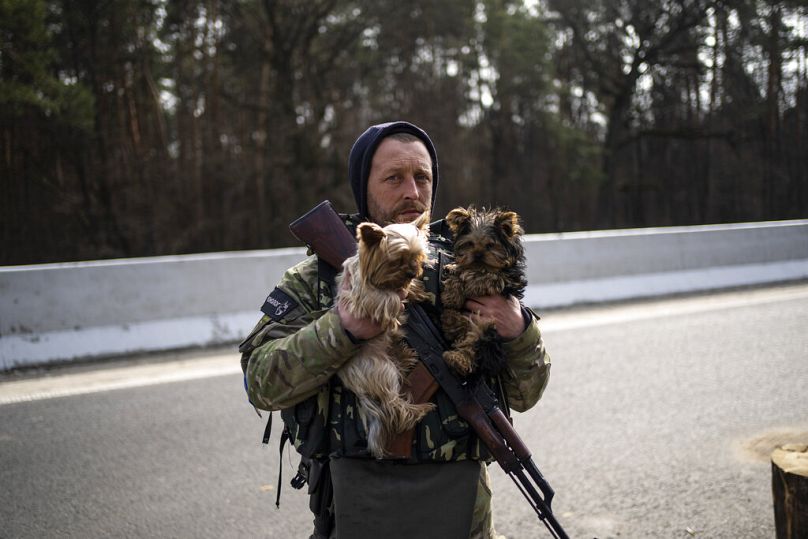
A Ukrainian soldier holds dogs rescued from the streets at a checkpoint in Brovary, on the outskirts of Kyiv, 26 March 2022
AP Photo/Rodrigo Abd
For three months, I’ve been volunteering in Ukraine and Poland. I also started a non-profit focused on sterilising, vaccinating, and microchipping these lost pets.
There are a lot of volunteers here working seven days a week, sixteen-hour days.
But with the archaic laws and the lack of regard for these animals, it’s nearly impossible to bring them out of Ukraine and find safety for them in a warm, loving home.
Don't forget that these animals depend on us
Three things need to happen: First, these animals need to be sterilised, vaccinated and microchipped.
If enough animals are helped, it will stop the rampant population growth that will swamp Ukraine and Eastern Europe with billions of unwanted animals. Yes, billions.
Second, animals need to be rescued and provided with food, warmth, and physical and emotional care.
Third, a system needs to be set up to get these animals adopted into loving, caring families.
The international community must tackle the ripple effects of the war in Ukraine
View Q&A: The war will be Ukraine’s modern creation myth, says Ukrainian historian
We have a realistic plan and have already started to provide a solution.
Ukraine War Animals Relief Fund has partnered up with hundreds of Ukrainian veterinarians and volunteers to spay/neuter, vaccinate, and microchip half a million dogs and cats.
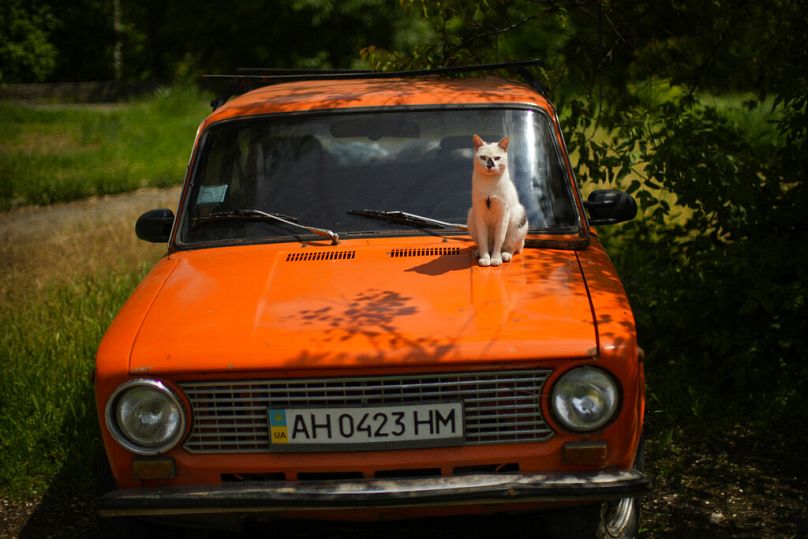
A cat sits on a car in a public park in Bakhmut, 24 May 2022
AP Photo/Francisco Seco
To date, we have piloted this on 4,000 animals and currently doing another 1,500 in recently liberated villages where conditions are horrific. We are trying to raise an additional $14 million (€13,1m) to complete the job.
I believe that the EU, Canada, and the US, along with charities around the globe, must prioritise animals in their response.
This will take people, processes, resources and some incredibly brave folks driving into very dangerous places so animals won’t starve.
A large, coordinated response is needed to work together to solve this challenge created unnecessarily by Putin.
Let’s take strong action to keep innocent animals healthy and safe — after all, they depend on us.
Daniel Fine is the co-founder and managing director of Ukraine War Animals Relief Fund, based in Seattle.
